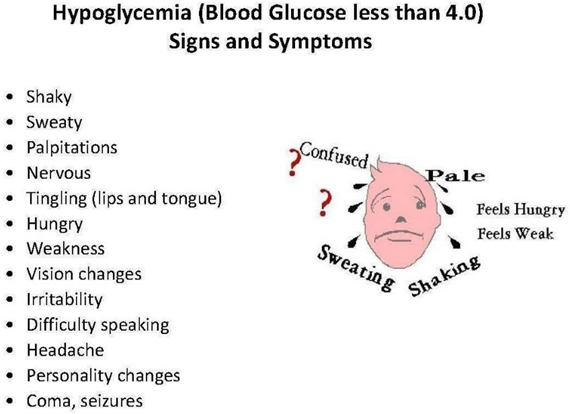A nurse is providing teaching to a client who has a new diagnosis of type 2 diabetes mellitus. The nurse should recognize that the client understands the teaching when he identifies which of the following as manifestations of hypoglycemia? (Select all that apply.)
Tachycardia
Polydipsia
Polyuria
Blurred vision
Moist, clammy
Correct Answer : A,D,E
A. Tachycardia, or increased heart rate, can occur during hypoglycemia as a result of the body's response to low blood sugar levels. The sympathetic nervous system is activated, leading to increased adrenaline (epinephrine) release, which can cause palpitations and tachycardia.

B. Polydipsia refers to excessive thirst. It is typically a symptom of hyperglycemia (high blood sugar levels) rather than hypoglycemia. During hypoglycemia, thirst is not a common symptom.
C. Polyuria refers to excessive urination. Similar to polydipsia, it is more commonly associated with hyperglycemia (high blood sugar levels) rather than hypoglycemia. Hypoglycemia typically does not cause polyuria.
D. Blurred vision can occur during hypoglycemia due to changes in the shape of the lens in the eye caused by altered fluid balance due to low blood sugar levels.
E. Moist, clammy skin is a common manifestation of hypoglycemia. When blood sugar levels drop, the body's autonomic nervous system responds by releasing adrenaline, which can cause sweating and clamminess.
Nursing Test Bank
Naxlex Comprehensive Predictor Exams
Related Questions
Correct Answer is C
Explanation
A. An N-95 respirator is designed to filter out airborne particles and is used primarily for protection against airborne diseases such as tuberculosis or certain respiratory infections like COVID-19. It is not necessary for contact precautions unless there is also a risk of airborne transmission.
B. Goggles protect the eyes from splashes, sprays, or droplets of infectious material. They are not typically required for routine contact precautions unless there is a risk of splashes or sprays to the eyes.
C. Gloves are essential for contact precautions. They protect the nurse's hands from direct contact with potentially infectious material on the client's bed linen or any contaminated surfaces. Gloves should be worn when handling soiled linen and removed and discarded appropriately after use.
D. A face shield provides full-face protection against splashes, sprays, or splatters of infectious material. It is particularly useful when there is a risk of exposure to bodily fluids or during procedures that may generate splashes. While not always required for routine contact precautions, it may be used depending on the specific situation, such as when cleaning surfaces heavily contaminated with body fluids.
Correct Answer is ["A","B","C","D"]
Explanation
Blood pressure 86/46 mm Hg
A blood pressure of 86/46 mm Hg indicates hypotension. Hypotension can be a sign of inadequate perfusion and may lead to organ dysfunction if not promptly addressed. Immediate action may include reassessment of the client's hemodynamic status, fluid resuscitation if indicated, and consideration of vasopressor medications under provider orders.
Oxygen saturation 94% on 2 L via nasal cannula
Although the oxygen saturation of 94% is within the acceptable range (typically ≥ 92% for most clients),
it should be monitored closely as per the prescribed titration to maintain ≥ 92%. If the oxygen saturation drops below the target range, the nurse may need to adjust the oxygen flow rate or consider alternative oxygen delivery methods to ensure adequate oxygenation.
Prescription for the transfusion of 2 units of packed RBCs
Transfusion of packed red blood cells (RBCs) is indicated, suggesting the client may have significant anemia or ongoing bleeding requiring correction of hemoglobin levels. Immediate action involves verifying the blood product compatibility, initiating transfusion per protocol (including pre-transfusion assessments), and monitoring the client closely for any signs of transfusion reaction or complications during the transfusion.
Pulse rate 100/min, respiratory rate 28/min
Elevated pulse rate (tachycardia) and respiratory rate (tachypnea) can indicate physiological stress, inadequate oxygenation, or compensation for decreased cardiac output due to hypotension. These vital signs should be closely monitored for any worsening trends or signs of instability that may require immediate intervention, such as further assessment for hypovolemia or respiratory distress.
Whether you are a student looking to ace your exams or a practicing nurse seeking to enhance your expertise , our nursing education contents will empower you with the confidence and competence to make a difference in the lives of patients and become a respected leader in the healthcare field.
Visit Naxlex, invest in your future and unlock endless possibilities with our unparalleled nursing education contents today
Report Wrong Answer on the Current Question
Do you disagree with the answer? If yes, what is your expected answer? Explain.
Kindly be descriptive with the issue you are facing.
